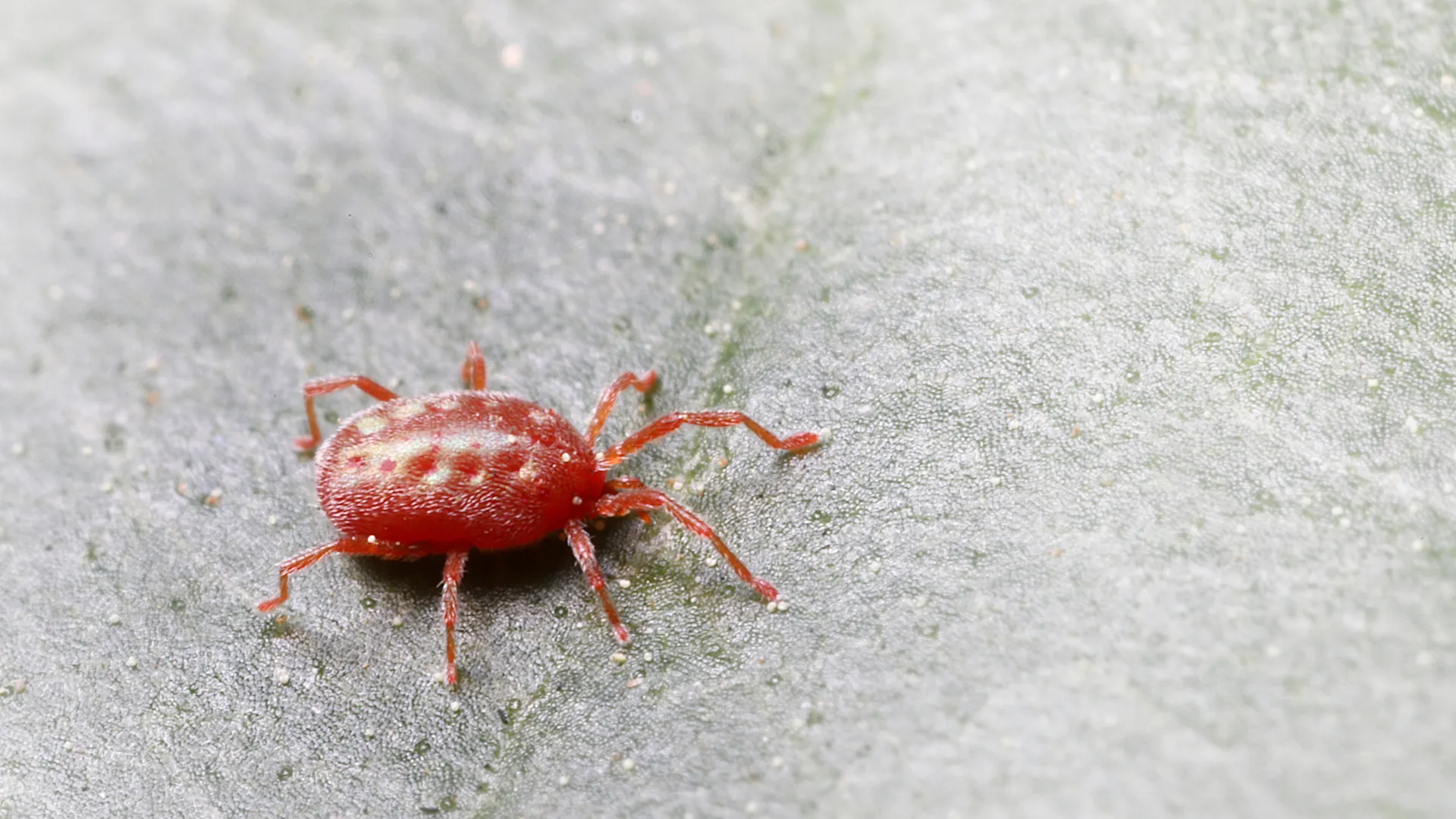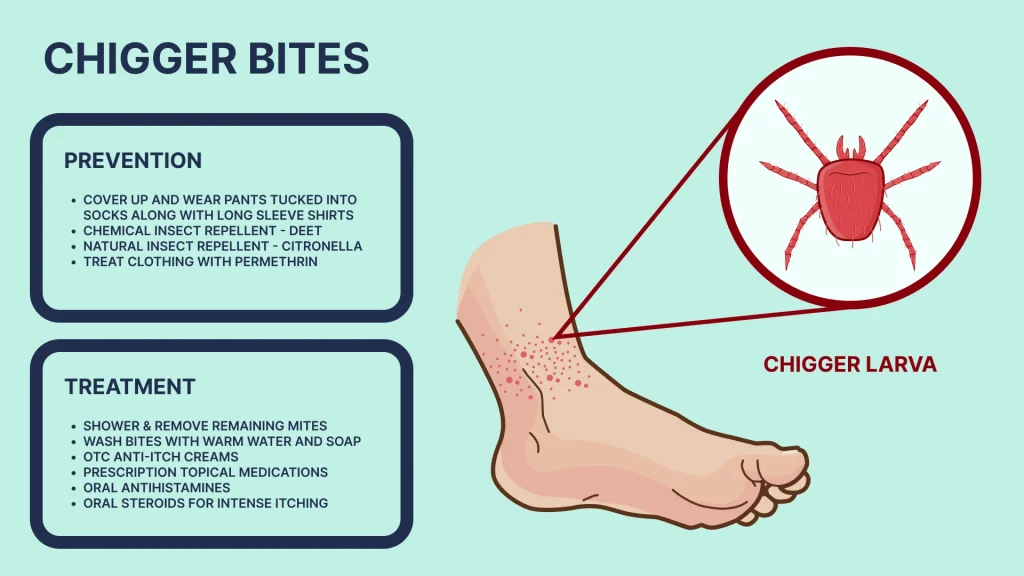



Chiggers are what we imagine was the creation of Satan himself. If you’ve ever experienced the wrath of these evil creatures, you know what we’re talking about.
Consider yourself lucky if you’ve never encountered these itchy pests. They’re one bug that we would be content never seeing ever again.
Today, we’ll share how to identify, heal, and prevent chigger bites.
Let’s get going!
While their official name is Trombiculidae mites, chiggers are minuscule arachnids. This means they’re in the same family as ticks and spiders. If you’re anything like us, you’re discovering that you’re liking the arachnid family less and less.
These microscopic creatures attach themselves to humans and inject enzymes into the skin tissue. Typically, within 24 hours, a small, red bump or welt develops. The natural response from the human body is intense itching and inflammation around the bite site.
Scratching the itch typically only makes the situation worse. Extreme cases of scratching can lead to severe infections. Luckily, the discomfort doesn’t last forever. It usually tends to go away within five to seven long days.
Pro Tip: If you’re struggling to keep the bugs at bay, check out The Best Bug Nets to Keep Bugs Out for Good before your next trip outdoors!
The most common way humans get chiggers is through direct contact with the larva. This is from humans entering an environment filled with chiggers. They primarily live in grassy fields, forests, and other areas of dense vegetation. They tend to be more active during summer and warmer months.
Spending time in these areas significantly increases your chances of encountering chiggers. Additionally, sitting or lying directly on the ground invites them to find your skin. If you know you’ll want to sit, it’s best to place a blanket or some barrier between you and the ground.

Chigger bites typically start as small, red bumps or welts. They may not look like much, but they can grow as the enzymes from the chigger spread under the skin’s surface. It’s common to find them in groups. Scratching them can cause them to become red and increase the severity of the itching.
Bites often occur in areas of your body where your clothes and skin come in contact. The most common spots are near waistbands and bra or sock lines. Additionally, if you were wearing shorts, they’ll attack the back of your knees and thighs.
If you’re unfortunate enough to find chigger bites, you’ll want to know how to treat them. Additionally, you’ll want to take steps towards experiencing them in the future. Here are some tips for how to treat and prevent chigger bites.
It may sound like common sense, but the best way to avoid chigger bites is to avoid areas infested with chiggers. Unfortunately, avoiding these areas may not always be possible. These pesky creatures can sneak up on you when you least expect it.
You could be on a hike or attending an event that requires you to traverse a chigger-infested area. Luckily, there are some things you can do in these situations to protect yourself from an attack.
One of the best things you can do is not to sit directly on the ground. Bring a blanket with you if you’re going to a concert, festival, or other event in a field. Putting your skin on the ground makes it extremely easy for them to access your skin. Because they are so small, you may not even notice or feel them climbing onto you.
Bring a camping chair or other foldable place to sit if you can. These can keep you off the ground and away from any potential encounter with them.

If you know you’ll be in an area infested with chiggers, consider what clothing you’ll be wearing. Wearing long sleeves and long pants is best since you want to keep your skin covered. Shorts, tank tops, and even sandals are some of the worst options. The less exposed skin you have, the better.
Also, spotting these annoying bugs on lighter clothes is much easier. You may be able to spot them and get them off of you before they can do any damage.
Like mosquitos and tickets, insect repellent can be great for keeping chiggers away. However, you want to apply it before you arrive. We suggest using it for 10 to 15 minutes before heading out into areas where you might encounter chiggers. This gives it time to create a barrier that chiggers are less likely to breach.
- Non-greasy, fragrance free, odorless; dries quickly and won’t damage plastics or synthetic coatings — safe for use on…
- Safe for use on the whole family, long-lasting insect and tick repellent spray deters a wide variety of pests — up to…
Creating as many barriers between your skin and chiggers is your best line of defense. Tucking your pants into your socks can help prevent them from crawling up your pant legs and onto your skin. You want to eliminate any potential gaps where they could find their way in.
Taking regular breaks to check and ensure your pants stay tucked is also a good idea. If you’re hiking or doing a lot of movements, you could accidentally leave yourself vulnerable to them.
After you’ve spent time outdoors, it’s always best to shower. This can help get any bits of nature off of you, including chiggers. Use warm water and a generous amount of soap to remove chiggers or their larvae sticking to you and your skin.
Additionally, tossing your clothes into the wash as soon as possible is a good idea. If you were camping and had bedding, you’ll want to wash that, too. Washing them in hot water can help ensure that you remove any chiggers that may have made the trip home.

The itch from a chigger bite can be incredibly overwhelming. Some people throw caution to the wind and scratch them relentlessly. Unfortunately, this typically does nothing but make the situation worse.
One of the best remedies is to apply an over-the-counter cream. These can be highly effective and provide some almost instant relief. If you start to itch again, all you have to do is apply another layer of cream.
If the itching doesn’t go away after a week or so, you should consult your physician. For those who have experienced chiggers, you’ll want to consult your doctor if anything appears out of the ordinary. The bumps and welts can be approximately the size of a quarter and still be normal. Regardless, if you experience more severe conditions, call your doctor.

We want to warn you that chiggers aren’t something you should ever take lightly. The itching they can cause will ruin your next five to seven days. It’s a terrible experience that we wouldn’t wish upon anybody. Take steps to prevent chigger bites and treat them quickly if you find yourself with them.


